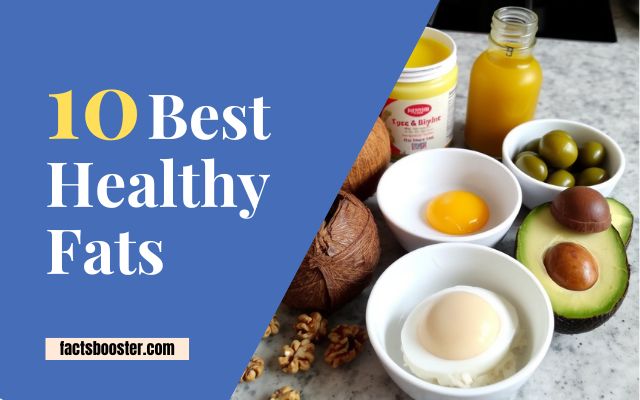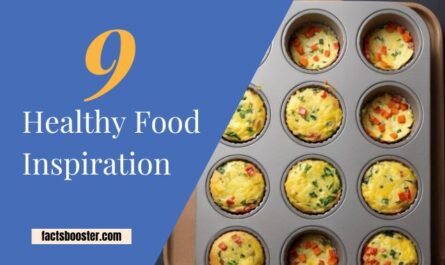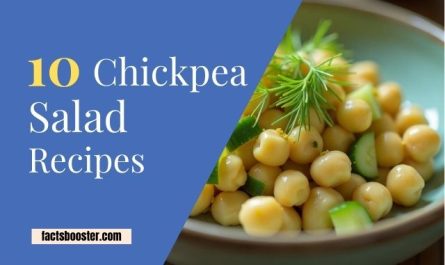Healthy fats are essential for maintaining overall well-being, supporting vital bodily functions, and improving various aspects of health. Contrary to the outdated belief that all fats are bad, certain fats can provide tremendous benefits when consumed in moderation. In this article, we’ll explore the 10 best healthy fats that can transform your diet and supercharge your body.
Benefits of Healthy Fats
Healthy fats are a critical component of a balanced diet, contributing to everything from brain function to heart health. Here are some key benefits of incorporating healthy fats into your diet:
- Brain Function: Omega-3 fatty acids are crucial for cognitive health, boosting brain power, and preventing degenerative diseases like Alzheimer’s.
- Heart Health: Monounsaturated and polyunsaturated fats help reduce bad cholesterol (LDL) and raise good cholesterol (HDL), lowering the risk of heart disease.
- Weight Management: Healthy fats help you feel full and satisfied, making it easier to manage your appetite and reduce overall calorie intake.
- Inflammation Reduction: Omega-3 fats are known for their anti-inflammatory properties, which help reduce chronic inflammation and promote overall well-being.
- Energy Boost: Fats provide a slow, sustained release of energy, making them a valuable macronutrient for physical and mental endurance.

10 Best Sources of Healthy Fats
There are various types of healthy fats, each with unique benefits. Below, we’ll explore the best sources of these essential fats and how they contribute to your health:
1. Olive Oil
Olive oil is a cornerstone of the Mediterranean diet, known for its high content of monounsaturated fats. These fats help reduce bad cholesterol (LDL) while maintaining or increasing good cholesterol (HDL), promoting heart health.
Olive oil also contains antioxidants, such as vitamin E and polyphenols, which further protect the heart by reducing inflammation and oxidative stress. Extra virgin olive oil, in particular, is minimally processed, preserving its nutrients and making it the best option for cooking or drizzling over salads.
2. Avocados
Avocados are unique fruits because they are loaded with healthy fats instead of carbs. They are packed with monounsaturated fats, which are beneficial for heart health by lowering bad cholesterol and supporting good cholesterol levels.
Additionally, avocados are rich in fiber, which aids digestion, and they provide various vitamins and minerals such as potassium, which helps regulate blood pressure. The creamy texture makes them versatile for salads, smoothies and spreads.
Read more:
3. Flaxseeds
Flaxseeds are tiny seeds with a big nutritional punch, rich in omega-3 fatty acids (specifically alpha-linolenic acid or ALA) and fiber. Omega-3s in flaxseeds have anti-inflammatory properties that support heart health and brain function.
They also contribute to lowering blood pressure and improving cholesterol levels. The high fiber content in flaxseeds aids digestion, helps prevent constipation, and can improve gut health. You can add flaxseeds to smoothies, oatmeal, or baked goods.
4. Chia Seeds
Chia seeds are a popular plant-based source of omega-3 fatty acids, making them an excellent choice for vegans and vegetarians. They also contain a significant amount of fiber, which promotes digestive health and can aid in weight management by helping you feel fuller for longer.
Chia seeds absorb liquid and form a gel-like consistency, making them great for chia puddings or as an egg substitute in baking. They also contain protein, calcium, and magnesium, contributing to bone health.
5. Walnuts
Walnuts are among the best plant-based sources of omega-3 fatty acids, particularly ALA, which supports heart health and reduces inflammation in the body. Eating walnuts can help improve cholesterol levels and lower the risk of heart disease. They also provide antioxidants, which protect the body from oxidative stress and aging. Walnuts are a versatile snack that can be added to salads, oatmeal, or baked goods.
6. Salmon
Salmon is a fatty fish rich in long-chain omega-3 fatty acids like EPA and DHA, which are essential for heart and brain health. Omega-3s from salmon help reduce inflammation, lower blood pressure, and decrease the risk of heart disease.
In addition to omega-3s, salmon is also a great source of high-quality protein, essential for muscle repair and overall body function. It is also rich in B vitamins, which support energy production and brain function.
7. Eggs
Eggs, especially the yolks, contain a mix of healthy fats, including phospholipids and saturated fats. Phospholipids are crucial for maintaining the structure of cell membranes, especially in the brain, making eggs a great brain-boosting food.
They are also a rich source of choline, a nutrient essential for brain health and development. Contrary to past beliefs, moderate consumption of eggs does not significantly raise cholesterol levels in most people and provides many essential nutrients such as protein, and vitamins A and D.
8. Coconut Oil
Coconut oil is primarily made up of medium-chain triglycerides (MCTs), which are unique fats that the body can quickly absorb and use for energy. This makes coconut oil an excellent choice for those looking for an energy boost, especially in low-carb or ketogenic diets. MCTs may also support fat-burning and metabolism.
While coconut oil is high in saturated fats, these MCTs are considered beneficial for brain health and energy production. Coconut oil can be used in cooking, baking, or as a natural moisturizer.
9. Ghee (Clarified Butter)
Ghee, made by removing the milk solids from butter, is rich in saturated fats but also contains beneficial nutrients like conjugated linoleic acid (CLA), which has been shown to reduce body fat and support heart health.
Ghee is lactose-free, making it suitable for those with dairy sensitivities. It’s also rich in vitamins A, E, and K2, which support skin health, eye health, and bone density. Ghee’s high smoke point makes it an ideal fat for cooking at higher temperatures.
10. Krill Oil
Krill oil, derived from small crustaceans, is rich in omega-3 fatty acids, particularly EPA and DHA, which are crucial for heart, brain, and joint health. What sets krill oil apart from other omega-3 sources is its high phospholipid content, which allows for better absorption and utilization of omega-3s in the body.
Krill oil is also rich in astaxanthin, a potent antioxidant that helps reduce oxidative stress and inflammation. It’s often taken as a supplement for its powerful health benefits.
Read more:
Healthy Fats List
Monounsaturated Fats
Monounsaturated fats are heart-healthy fats that help lower bad cholesterol (LDL) and increase good cholesterol (HDL). These fats are great for overall cardiovascular health and are often found in plant-based oils. (1)
- Examples: Olive oil, avocado, nuts (almonds, cashews, hazelnuts).
- Benefits: Improves heart health, aids in weight management, and supports brain function.
Polyunsaturated Fats
Polyunsaturated fats include both omega-3 and omega-6 fatty acids, which are essential fats your body needs but cannot produce on its own.
- Examples: Sunflower seeds, flaxseeds, and fish.
- Benefits: Regulates cholesterol levels, reduces inflammation, and promotes brain and skin health. (2)
Omega-3 Fatty Acids
Omega-3 fatty acids are a crucial part of cell membranes and play an essential role in brain function and heart health.
- Examples: Fatty fish (salmon, mackerel), flaxseeds, and chia seeds.
- Benefits: Reduces inflammation, improves cognitive function, supports heart health.
Omega-6 Fatty Acids
While omega-6 fatty acids are also essential, they must be consumed in balance with omega-3s to prevent excess inflammation.
- Examples: Safflower oil, soybean oil, and walnuts.
- Benefits: Supports brain health, helps control blood sugar levels, and promotes healthy skin.
Saturated Fats
Saturated fats have been misunderstood for years. In moderation, they support immune function and provide an energy source.
- Examples: Coconut oil, grass-fed butter, and ghee.
- Benefits: Can boost energy, promote fat metabolism, and support immune health.
Medium-Chain Triglycerides (MCTs)
MCTs are a type of fat that is easily digested and quickly converted into energy, making them popular in ketogenic diets.
- Examples: MCT oil, and coconut oil.
- Benefits: Boosts energy, supports fat burning, and may improve cognitive function. (3)
Phospholipids
Phospholipids are essential for cellular health, particularly in maintaining the integrity of cell membranes.
- Examples: Egg yolks, and krill oil.
- Benefits: Supports brain health, improves liver function, and enhances cellular repair. (4)
Fats to Avoid
While some fats are beneficial, others can be harmful to your health. Fats to avoid include:
Trans Fats
Trans fats are artificially created through a process called hydrogenation, which makes liquid oils solid at room temperature. These fats are harmful as they increase bad cholesterol (LDL) and lower good cholesterol (HDL), raising the risk of heart disease. Examples include:
- Margarine (especially stick margarine)
- Shortening (used in baking and frying)
- Fried foods (like French fries, doughnuts, and fried chicken from fast-food chains)
- Packaged baked goods (such as cookies, cakes, pies, and pastries)
- Microwave popcorn (some varieties)
- Frozen pizzas (with a lot of processed cheese or dough)
- Non-dairy coffee creamers
Highly Processed Vegetable Oils
Highly processed vegetable oils are extracted and refined through chemical processes, which strip away many nutrients and can lead to the formation of harmful compounds when heated at high temperatures. These oils are often high in omega-6 fatty acids, which, in excess, can cause inflammation. Examples include:
- Soybean oil
- Canola oil
- Corn oil
- Palm oil
- Cottonseed oil
- Vegetable oil blends (often labeled generically as “vegetable oil”)
- Sunflower oil (highly refined varieties)
Tips on Adding Healthy Fats to Your Meals
Incorporating healthy fats into your diet doesn’t have to be complicated. Here are some simple ways to add them to your meals:
- Drizzle olive oil on salads or use it for sautéing vegetables.
- Add avocado to your smoothies, salads, or toast for a creamy, nutrient-dense boost.
- Sprinkle flaxseeds or chia seeds into your yogurt, oatmeal, or smoothies.
- Snack on a handful of nuts or add them to your meals for a crunchy texture.
- Use coconut oil for cooking or in your baking for a subtle, tropical flavor.
How Much Fat Per Day?
The amount of fat you need per day depends on your calorie requirements, but typically, 20-35% of your daily calories should come from fats (5). It’s important to focus on quality fats rather than quantity. For example, a 2,000-calorie diet should include around 44 to 77 grams of fat, with most of it coming from healthy fat sources like the ones mentioned above.
Conclusion
Healthy fats are a vital part of any balanced diet. Incorporating a variety of monounsaturated, polyunsaturated, and other essential fats can provide numerous health benefits, from boosting brain function to supporting heart health. By making mindful choices and avoiding harmful fats, you can enjoy the advantages of healthy fats while keeping your body in optimal condition.


